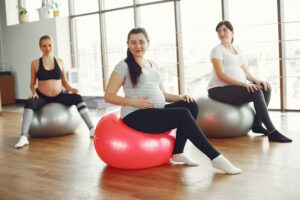
Pregnancy and the postnatal period are transformative stages in a woman’s life that require special attention to physical well-being. Pilates is a gentle yet effective exercise method that can support and enhance the health and fitness of pregnant women and new mothers. Pilates equipment, with its adjustable resistance, support, and versatility, provides a safe and effective way to engage in Pilates during pregnancy and postnatal recovery. In this article, we will explore the best Pilates practices for pregnancy, discuss the Pilates exercises that are beneficial for the postnatal period, examine postnatal Pilates, and highlight the benefits of Pilates for postnatal women.
What is the best Pilates for pregnancy? When it comes to Pilates for pregnancy, the best approach is to focus on exercises that are safe, supportive, and suitable for the changing needs of the body during this special time. Prenatal Pilates typically emphasizes gentle movements, core strengthening, and exercises that promote good posture and alignment. The use of Pilates equipment, such as the reformer and stability ball, can provide added support and stability, allowing pregnant women to engage in a safe and effective workout. Modified exercises that avoid excessive strain on the abdominal muscles, pelvic floor, and joints are recommended. Additionally, exercises that promote relaxation, breath control, and body awareness can help prepare expectant mothers for labor and childbirth.
Which Pilates is best for postnatal? Postnatal Pilates focuses on rebuilding strength, stability, and alignment after childbirth. It is important to gradually reintroduce exercise and take into consideration the physical changes that occur during pregnancy and childbirth. Pilates exercises that target the deep core muscles, pelvic floor, and postural muscles are particularly beneficial for postnatal women. The use of Pilates equipment, such as the reformer and stability chair, can provide support and assistance during postnatal workouts. It is important to start with gentle exercises and gradually increase intensity and challenge as the body heals and gains strength. Postnatal Pilates aims to restore strength, improve posture, and address any imbalances that may have occurred during pregnancy.
What is postnatal Pilates? Postnatal Pilates is a specialized form of Pilates designed to support women in their postpartum recovery and help them regain strength and stability. It focuses on rebuilding the core muscles, including the pelvic floor and deep abdominal muscles, which may have been weakened during pregnancy and childbirth. Postnatal Pilates also addresses the postural changes that occur due to increased breast size and the demands of caring for a newborn. The exercises in postnatal Pilates are gentle and controlled, allowing women to gradually regain strength and mobility without compromising their recovery. The use of Pilates equipment provides support and resistance, helping to engage the muscles effectively and safely.
Is Pilates good for postnatal? Yes, Pilates is highly beneficial for postnatal women. It offers a safe and effective way to rebuild strength, improve posture, and regain overall fitness after childbirth. Pilates exercises focus on the core muscles, which are vital for postnatal recovery. The controlled and precise movements in Pilates help to re-establish a strong and stable core, which is essential for everyday activities and the demands of caring for a newborn. Pilates also promotes body awareness, breath control, and relaxation, which can aid in reducing postpartum stress and promoting overall well-being. Additionally, the use of Pilates equipment provides support and assists in targeting specific muscle groups, making it suitable and effective for postnatal women.
In summary, Pilates equipment offers a safe and effective way to engage in Pilates during pregnancy and postnatal recovery. Prenatal Pilates focuses on gentle movements, core strengthening, and exercises suitable for the changing needs of the body during pregnancy. Postnatal Pilates aims to rebuild strength, stability, and alignment after childbirth, targeting the core muscles and addressing postural changes. Pilates is highly beneficial for postnatal women, providing a safe and effective means to regain strength, improve posture, and promote overall well-being. Incorporating Pilates equipment into prenatal and postnatal Pilates practices offers added support, stability, and versatility, enhancing the benefits of Pilates during these transformative stages in a woman’s life.